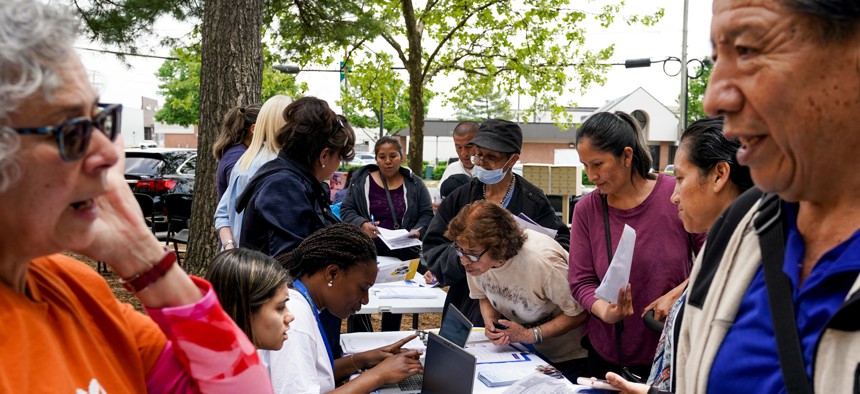Feds Give States More Flexibility in Medicaid Redeterminations

Families gather for Medicaid eligibility and enrollment information offered by a community-based organization in Springfield, Virginia. Jahi Chikwendiu/The Washington Post via Getty Images
But, according to federal data, states already aren’t using all the latitude given to them to keep eligible people on the low-income health care program.
As states go about the mammoth task of reevaluating whether all of the roughly 93 million people on Medicaid still qualify, the federal government this week gave states more flexibility in the hopes that fewer eligible people would be removed from the low-income health care program.
The Centers for Medicare & Medicaid Services (CMS) approved a number of new waivers Tuesday meant to help states address the challenges they are facing in relation to the so-called Medicaid unwinding. Some of the waivers include giving states another month to conduct additional targeted outreach and allowing managed care plans to assist people in completing their Medicaid reenrollment forms.
Concerning federal officials, however, is that CMS data show that states aren’t taking full advantage of the flexibilities they have already been given. For example, the federal government had previously OK’d letting states opt to keep people enrolled in Medicaid even if they hadn’t reapplied, so long as other government data show they are living in poverty. But only 33 states are doing so.
By electing not to use all the flexibilities available to states, CMS officials said in a call with reporters on Tuesday that many on Medicaid are losing their coverage, not necessarily because their incomes are not low enough, but because of “procedural reasons” like not reapplying for Medicaid on time.
The decision by CMS to grant more waivers comes as preliminary data examined by KFF, formerly known as the Kaiser Family Foundation, indicates that at least a million people in 20 states have been removed from the program since the reenrollment process started on April 1.
In all, about 40% of those who have been reevaluated in the 20 states that have filed reports with the federal government have been removed, according to KFF. The rate, though, varies widely from 12% in Nebraska to 73% in Idaho. The percentage of people being disenrolled for procedural reasons also varies by state, from 89% in Kansas to 43% in Pennsylvania.
Bradley Corallo, a senior policy analyst with KFF’s Program on Medicaid and the Uninsured, cautioned that the data is not complete and that the numbers could merely reflect the different ways states are going about reassessing people. For example, some states may be removing more people than others because they are looking at those they suspect are no longer eligible first while other states are reexamining people based on the anniversary of when they first signed up.
In a letter on Monday, U.S. Health and Human Services Secretary Xavier Becerra urged the nation’s governors to take better advantage of the flexibility CMS has given them.
“Given the high number of people losing coverage due to administrative processes,” he wrote, “I urge you to review your state’s currently elected flexibilities and consider going further to take up existing and new policy options that we have offered to protect eligible individuals and families from procedural termination.”
Minnesota leads the nation in using 11 of the 17 waivers, while Florida and Montana are not using any of the flexibilities, according to CMS, including using change of address forms filed with the U.S. Postal Service to notify people they need to reapply for the program. Of all the flexibilities available, most states—37—are using change of address forms to send renewal notices.
By giving states another month to conduct “additional targeted outreach” to let people know they have to reapply for the program, CMS is trying to address a major concern among federal and state officials that people might not know what’s required of them.
Among the new waivers, CMS is also allowing pharmacies and community-based organizations—in addition to managed care plans—“to facilitate reinstatement of coverage for those who were recently disenrolled for procedural reasons based on presumptive eligibility criteria.”
“This work is all hands on deck,” CMS Administrator Chiquita Brooks-LaSure told reporters.
Dan Tsai, deputy administrator of CMS, added that the agency wants states to use “all” the flexibilities they’ve been given. But the most beneficial, he said, is to automatically reenroll people if they have information that they are eligible for Medicaid. That way, he said, states do not “even have to send out a renewal form that may or may not get to these individuals.”
According to CMS data, only 20 states are automatically reenrolling people if they qualify for food stamps and only five if they qualify for the Temporary Assistance for Needy Families program. Thirty-three states are renewing Medicaid for people if they have data that shows they have no income and only four if it shows their income is below the federal poverty line.






